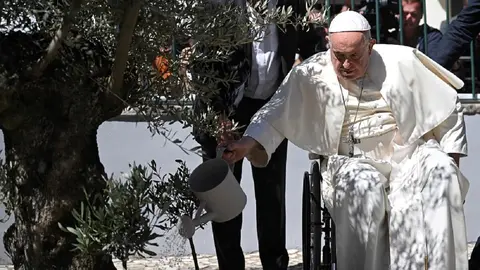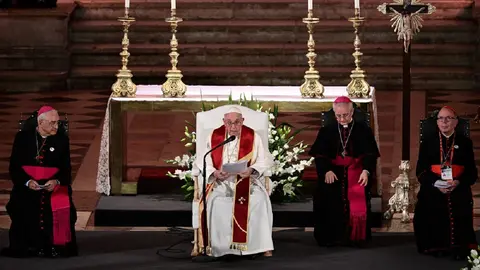At WYD in Lisbon, young Ukrainians between sorrow and celebration

With the Ukrainian flag on her back, Olena Shevchuk rediscovered a taste for celebration for a few days at the World Youth Days in Lisbon. But the pain of the war ravaging her country has not left her thoughts.
"It's very difficult for us to understand that life is normal here," explains the 24-year-old student to AFP, who, like some 500 Ukrainians, has come to take part in this great international Catholic gathering with Pope Francis.
Like the planes flying low in the Lisbon sky, she had "lost the habit" of seeing scenes of everyday life in a European capital at peace since the invasion of Russian troops in February 2022.
"Here there is music everywhere, cafes and restaurants open at night, you can go wherever you want," a reality that contrasts with the curfew imposed every night at 11pm in her central Ukrainian town of Vinnytsia.
Like her, her comrades - often dressed in the traditional embroidered shirt - try to forget the war during this week of festive, cultural and spiritual events. It is a break from the hundreds of thousands of pilgrims from all over the world who have flooded the streets of Lisbon, flags in hand and bags on their backs.
"Despite the war and all the difficulties", after a long journey and fifteen hours of blockade at the Polish border, "we are here", rejoices Father Roman Demush, vice-responsible for the pastoral care of young Ukrainian Greek-Catholics, who represent about 8% of the country's population.
The young people he accompanies "live a terrible reality, with daily bombardments (...) They have come to find a little peace", says the priest as he leaves the church that serves as their headquarters in the Graça neighbourhood, on one of the hills of old Lisbon.
"Everyone greets us, they tell us they are praying for us, it's very exciting," says Olena, with blue-green eyes and red hair. On her banner, words written in black marker: "France loves you!

"Crying" with the Pope
A little further on, in front of a stand, volunteers offer passers-by virtual reality headsets that immerse the viewer in war-torn Ukraine, scenes of chaos in 360° that contrast with the music and bright colours of this lively neighbourhood overlooking the Tagus.
On Thursday morning, around 15 members of the group met with the Pope in private.
"He listened to the stories of the families, of the massacres provoked by Russia on our territory. We cried together, we talked, we prayed and at the end we symbolically shared bread and water," says Fr Demush.
The Argentinian Jesuit had mentioned a joint initiative between young Ukrainians and the handful of Russians present in Lisbon. But the initiative has so far been neglected.
And the Russians? "We don't see them, and so much the better," says Father Demush, who believes that such a meeting would cause "even more suffering" for the young people.
"You can't have a dialogue between a murderer and a victim. Of course, young people are not guilty, but they must take a stand against the policies of their country," he says.
"It would be strange and uncomfortable," confirms Olena Syniuha, a 19-year-old from Lviv, in the west of the country. "Because the pain lives in our hearts, we don't want any form of interaction with them, it's really painful to see what they do".

The group is overwhelmingly made up of girls. And rightly so: the law prohibits men from leaving the country for military service once they reach the age of majority.
"It's really very sad, of course there are many boys who wanted to come (...) but they can't", laments Olena Syniuha. On her wrist she wears a bracelet donated by Spanish pilgrims.
"We feel a kind of mission that we have to be here on their behalf. We have to absorb all the support we have received and give it to them," she says.
The young woman promises to "go back to Ukraine full of joy, hope and support so that they can feel it". "And maybe at the next World Youth Day they can come with us.










